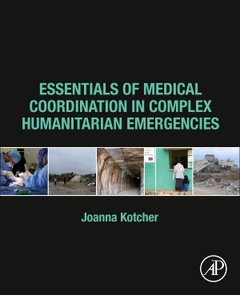Essentials of Medical Coordination in Complex Humanitarian Emergencies
Langue : Anglais
Auteur : Kotcher Fuller Joanna

A health coordinator in the field is required to quickly assess the needs of a population in a humanitarian emergency, initiate start-up procedures, and coordinate the response over a period of months or longer. The efficiency and effectiveness of this process depends on the experience, knowledge, and skills of the coordinator. Essentials of Medical Coordination in Complex Humanitarian Emergencies provides a practical overview for health coordinators in assessing, coordinating, and implementing medical and public health responses in disaster and conflict environments. The book aims to achieve this in two parts. Part one covers foundational information such as the role of the coordinator; project assessment and start-up; standards, protocols, and guidelines; project strategy and accountability; and basic epidemiological measurements and tools. Part two goes on to discuss the implementation of programs and services like nutrition, mental health and psychosocial support (MHPSS), management of chronic disease, community health promotion, sexual and reproductive health, health information systems and disease surveillance. With the addition of useful appendices and case studies, Essentials of Medical Coordination in Complex Humanitarian Emergencies is a resource for those in the medical, public health, and international humanitarian aid sectors who care about the health of populations at risk.
Part 1: Foundation
1. Elements of low resource and conflict environments
2. Humanitarian health systems: one sector within a coordinated response
3. Standards, protocols, guidelines
4. The role of the coordinator
5. Assessment and start-up
6. The project proposal: essential elements
7. Basic epidemiological measurements and tools
8. Team management and coordination
Part II: Implementation
9. Medical logistics
10. Primary health care
11. Sexual and reproductive health
12. Emergency medical care
13. Laboratory and safe blood transfusion
14. Surgical services
15. Trauma surgery in armed conflict
16. Expanded program on immunization (EPI)
17. Nutrition
18. Mental health and psychosocial support (MHPSS)
19. Management of non-infectious disease
20. Community health promotion
21. Health information systems and disease surveillance
22. Humanitarian medics and human rights
Appendices
1. Sample job descriptions for medical/health coordination
2. Indicators by health care sector
3. Commonly used epidemiological tools
4. Sample training outlines by sector
5. Universal precautions
6. Minimum standards for aseptic technique
1. Elements of low resource and conflict environments
2. Humanitarian health systems: one sector within a coordinated response
3. Standards, protocols, guidelines
4. The role of the coordinator
5. Assessment and start-up
6. The project proposal: essential elements
7. Basic epidemiological measurements and tools
8. Team management and coordination
Part II: Implementation
9. Medical logistics
10. Primary health care
11. Sexual and reproductive health
12. Emergency medical care
13. Laboratory and safe blood transfusion
14. Surgical services
15. Trauma surgery in armed conflict
16. Expanded program on immunization (EPI)
17. Nutrition
18. Mental health and psychosocial support (MHPSS)
19. Management of non-infectious disease
20. Community health promotion
21. Health information systems and disease surveillance
22. Humanitarian medics and human rights
Appendices
1. Sample job descriptions for medical/health coordination
2. Indicators by health care sector
3. Commonly used epidemiological tools
4. Sample training outlines by sector
5. Universal precautions
6. Minimum standards for aseptic technique
public health practitioners; health care professionals responsible for coordinating and managing humanitarian response; administrative individuals in the field during emergencies, conflicts, and natural disasters; international aid agencies; Public Health masters and doctoral students, medical professionals and health administrators contemplating disaster relief and Global Health careers
Joanna Kotcher holds a Master’s Degree in Global Health, a Bachelor of Science in Nursing and a BA in International Studies. She has coordinated emergency response in conflict environments for the past 18 years in such locations as Kosovo, Central Asia (Tajikistan), Afghanistan, Darfur, Gaza and the OPT, Somaliland, Syria, and Iraq. As a Medical/Surgical Coordinator Ms. Kotcher has coordinated and managed medical teams in the start-up and full implementation stages of projects that assist populations in need of emergency medical and surgical care during armed conflict. She has also coordinated post-conflict actions during the period immediately following “official cessation of armed conflict. Working in insecure environments, Ms. Kotcher has extensive experience in the design and implementation of medical/surgical actions, team building and support, implementation of standards and guidelines, medical and nursing staff training, and team mentoring. She continues to study and learn while working in the field and maintaining membership with notable professional organizations in the combined disciplines of humanitarian studies and medical/surgical assistance.
- Details essential foundational knowledge as well as protocols, guidelines, and standard procedures for lead international agencies such as the World Health Organization (WHO), UNICEF, SPHERE, and the Inter-agency Working Group
- Written by author who has coordinated emergency response in conflict environments such as Kosovo, Central Asia (Tajikistan), Afghanistan, Darfur, Gaza and the OPT, Somaliland, Syria, and Iraq
- Elaborates on the actual tasks and skills related to field work in coordinating and implementing a response for complex humanitarian emergencies
Date de parution : 11-2024
Ouvrage de 400 p.
19x23.3 cm
Thèmes d’Essentials of Medical Coordination in Complex... :
© 2024 LAVOISIER S.A.S.



